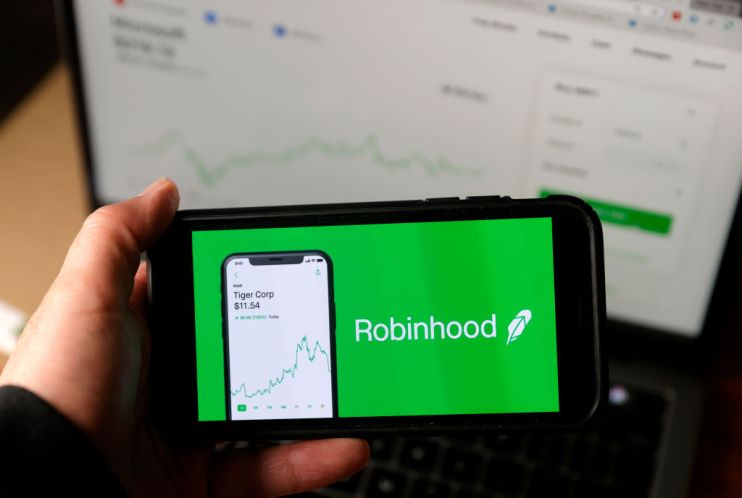Does the UK really want Robinhood?

Sat among the glitterati of Wall Street at Hampton Court on Monday was a younger, longer haired and slightly less recognisable figure.
The likes of Jamie Dimon, Steve Schwarzman and David Solomon understandably grabbed the media’s attention at the government’s chest-thumping Global Investment Summit. But 36-year Bulgarian-American entrepreneur Vlad Tenev, the founder and chief of retail trading platform Robinhood, was quietly preparing for his own splashy headlines later in the week.
Robinhood announced on Thursday it would be launching its latest bid to crack the UK after two previous attempts fell over at the eleventh hour. The first was abandoned in 2020 after bosses decided to focus on the explosion of trading in their home market in the US. Then last year it U-turned on a swoop for UK trading platform Ziglu.
Some have mixed feelings over the latest UK push. Robinhood has been a controversial player in the world of retail investing since it swung into the public consciousness in the pandemic-induced trading boom of 2020.
The firm was accused of reckless ‘gamification’ of the markets when 20-year old Alex Kearns committed suicide after a trade went sour. Robinhood then shot to global infamy again in 2021 as the central player in the so-called meme stock frenzy, which saw ailing US stocks rocket in value in a David vs Goliath battle for the stock market.

Since then Robinhood has looked to tighten some of its guardrails and prevent a similar tragedy to Kearns, with more educational material and enhanced requirements for those looking to trade with more cash.
But its fortunes have been mixed ever since. Shares in the Nasdaq-listed firm plummeted earlier this month when it reported a steep fall in trading volumes in the third quarter.
Robinhood missed the market’s revenue estimates after a 13 per cent slump in transaction stock trading revenues. Crypto trading meanwhile fell 55 per cent year on year.
A fresh growth push in the UK and Europe is seen as a potential route to revive some of that growth.
But is there really the appetite for it?
“There’s a lot of companies in the US that are struggling for growth looking to the UK as the answer. Robinhood has stagnated since the end of the memestock craze and tried to expand into a more generalist provider,” Simon Taylor, head of strategy at fintech consultancy Sardine, tells City A.M.
The retail trading market is a rather saturated one in the UK. Robinhood’s primary stockbroking competitor Public.com launched in the UK six months ago, and fintech trading firm Freetrade, which was forced to slash its valuation by around 65 per cent in a crowdfunding round over the summer, already has a foothold.
Alongside that are the already more established retail player eToro, Hargreaves Lansdown and Trading 212, and stock trading platforms offered by challenger banks like Revolut.
“My question is if the UK market is big enough for three new players, and how meaningful this will be for Robinhood in the long term,” Taylor adds.
The appetite for investment has also been on the slide in recent years. Retail investors control just 21 per cent of UK assets under management, the lowest percentage in Europe, according to a report from the Centre for Policy Studies, and the percentage of UK equities owned by UK residents has been falling consistently for decades.
Just 11 per cent of households own shares in domestic companies, according to New Financial.
Robinhood will crucially allow firms to access US-listed stocks rather than UK ones, potentially allowing it to dodge some of the doom and gloom that has dampened appetite for UK companies.
Some analysts are more generous about its prospects. David Barton Grimley from fintech consultancy 11:FS says the UK is still a “super appealing” market for fintech firms due to cooperative regulation and a “significant affluent fintech-engaged population”.
“Robinhood’s appeal in the US was to a younger tech-savvy audience looking to access the shares market. It’s likely they’ll appeal to a similar audience in the UK who have previously found the price and access barrier to the stock market too high,” he tells City A.M.
“I can see them going head-to-head with Freetrade in terms of target market to start and then moving on to target a more investment savvy audience such as HL users, with bigger investment wallets.”
The expansion has also been warmly received by ministers. Investment minister Lord Johnson threw his support behind the news on Thursday describing it as a vote of confidence in the UK fintech scene.
An executive at a top retail investment firm told City A.M. that Robinhood has also been mounting a charm offensive on the Labour party and the firm was “everywhere at Labour party conference trying to jump on the retail investment policy bandwagon”.
Robinhood, which declined to comment for this piece, has been working with regulators from as far back as 2019 in order to win the permissions to operate in the UK.
Some 300,000 people signed up to the firm’s waiting list when it first eyed up a move, and backing from officialdom is looking positive. But whether retail investors are as enthusiastic for the long term is yet to be seen.